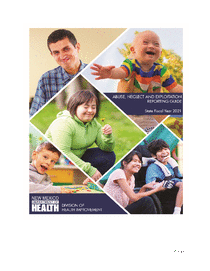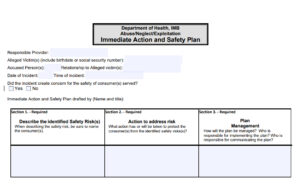These guidelines describe the process for reporting abuse, neglect, exploitation, suspicious injuries, environmental hazards, and death in community-based Medicaid waiver programs.
Home and community-based Medicaid waiver programs include the Developmental Disability Waiver (DDW) living supports, community supports, employment services providers, DDW case managers, Mi-Via Waiver Providers, Medically Fragile Waiver providers.
File A Report
Visit our Reporting Neglect, Abuse, Exploitation Page
Guide
 Please see our Community Program ANE Reporting Guide for full details on the incident reporting process.
Please see our Community Program ANE Reporting Guide for full details on the incident reporting process.
Topics include definitions, how to recognize reportable incidents, how to report, immediate action and safety plans, responding to sexual assaults, regulatory highlights, regulatory requirements, details about the investigation process, contact information, and more.
We also have a Spanish version of this guide available. Please see the Abuso, Negligencia y Explotación Información Guía publication for more info.
Immediate Action and Safety Plan
 The NMAC 8.370.10 includes the responsibility of community based providers to develop an Immediate Action Safety Plan (IASP) to keep people safe and implement the plan when an incident or allegation of abuse, neglect, exploitation, environmental hazard or suspicious injury is reported.
The NMAC 8.370.10 includes the responsibility of community based providers to develop an Immediate Action Safety Plan (IASP) to keep people safe and implement the plan when an incident or allegation of abuse, neglect, exploitation, environmental hazard or suspicious injury is reported.
The immediate action/safety plan outlines what happened and to whom, identifies who could be at risk because of what happened or was alleged to have happened, includes the provider’s plan to keep people safe while the DHI/IMB investigation takes place, and identifies who is responsible for making sure that the plan is followed and revised as needed.
Provider Training
DHI has implemented a new ANE provider training process which all agencies are required to complete. The new training uses a train-the-trainer model focusing on new competency-based training on recognizing and reporting Abuse, Neglect and Exploitation.
Please visit our Abuse, Neglect & Exploitation Provider Training page for more details.
Visit our Reporting Neglect, Abuse, Exploitation Page